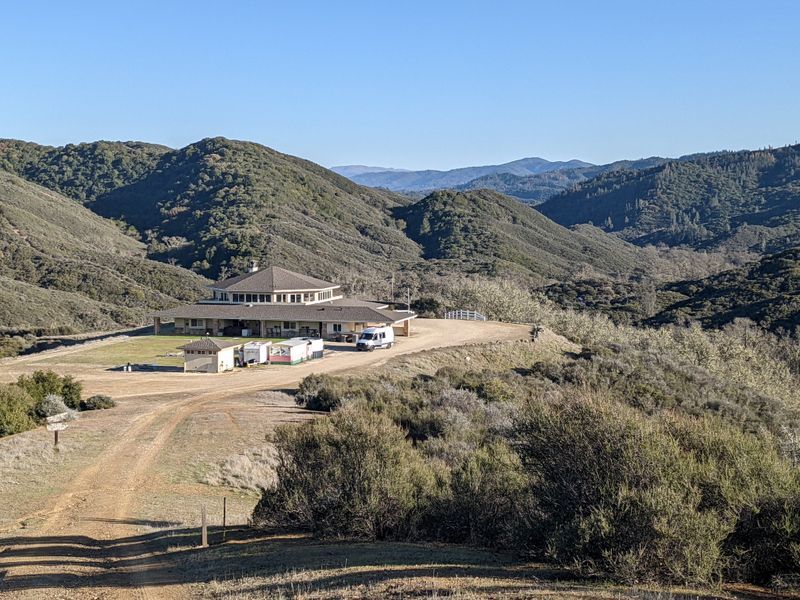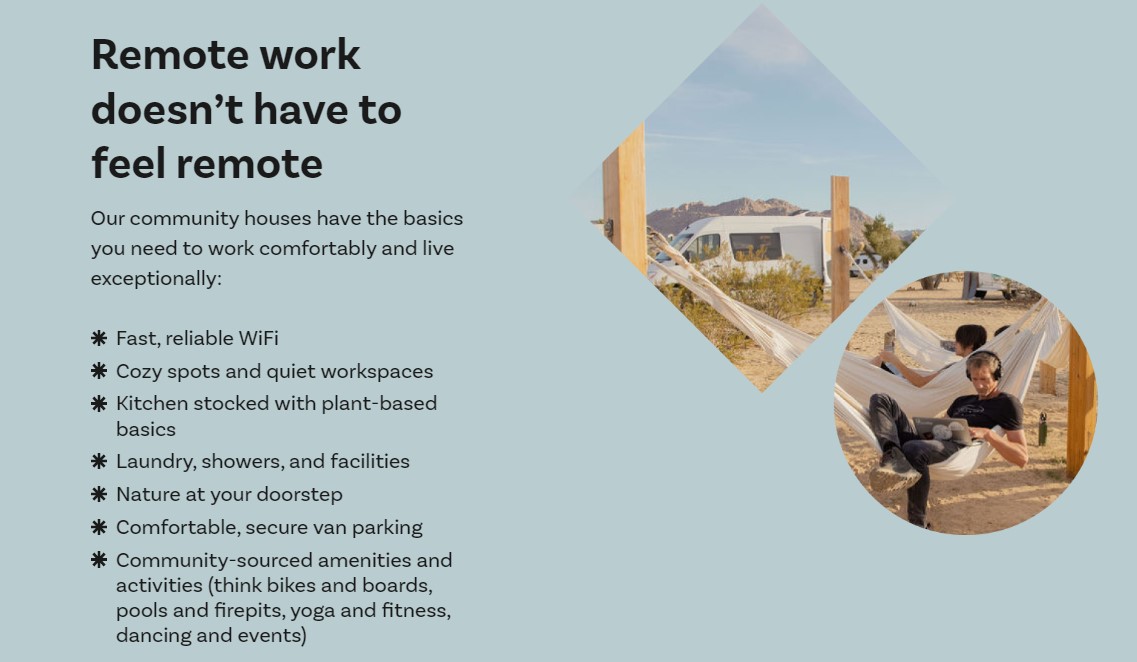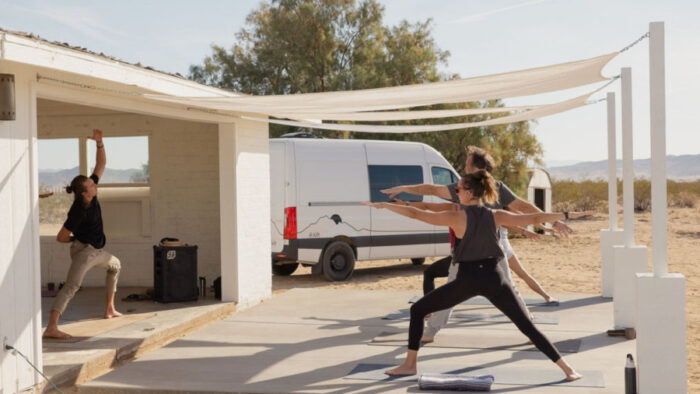อ่านบทความใน Bloomberg พูดเรื่องบริษัท Kift สตาร์ตอัพที่ทำเรื่องการอยู่อาศัยในรถตู้-รถบ้าน (co-living on wheels) แล้วคิดว่ามีประเด็นน่าสนใจ
Bloomberg อธิบายว่า Kift คือ Airbnb (live) + WeWork (work) แต่ทุกอย่างทำในรถตู้แทน เหมาะสำหรับคนทำงานรุ่นใหม่ที่มองหาชีวิตแบบ nomad life
ชีวิตแบบ nomad life คนที่ไม่มีบ้านเป็นตัวเป็นตน ไม่ใช่เรื่องใหม่ในสหรัฐอเมริกา และได้รับความนิยมมากขึ้นเรื่อยๆ ด้วยซ้ำ (เคยเขียนเรื่องนี้ไว้ในบล็อก Nomadland)
อย่างไรก็ตาม ถ้าแยกย่อยในรายละเอียด คนที่อาศัยอยู่ในรถบ้าน-รถตู้ มีเหตุผลที่แตกต่างกันไป ทั้งเหตุผลด้านเศรษฐกิจ (ไม่มีเงินเช่าบ้าน) เหตุผลด้านสังคม (ติดเพื่อนที่อยู่ต่างเมือง, ไม่ชอบอยู่ในบ้าน) หรือเหตุผลเรื่องจิตวิญญาณ-ความชอบส่วนตัว อยากมีอิสระ ไม่อยากผูกมัด ฯลฯ ซึ่งปัจจุบันมีคลิป Van Life หรือ Living in a Car เป็นจำนวนมาก
สิ่งที่ Kift สนใจ คือ กลุ่มคนที่ไม่มีปัญหาทางเศรษฐกิจ คือมีงานแบบ white-collar ที่เป็น high-pay เรียกว่ามีฐานะในระดับหนึ่งนั่นล่ะ แต่ตัวเนื้องานไม่จำเป็นต้องเข้าออฟฟิศ แล้วเลือกใช้ชีวิตอยู่ในรถด้วยเหตุผลเรื่องความเป็นอิสระ ได้เดินทางเปลี่ยนสถานที่ไปเรื่อยๆ พบเจอผู้คน
The Kift residents I met in Joshua Tree ranged from their 20s to their 60s, including a startup founder, a software engineer, a metaverse marketer, a creative agency designer, two program managers, an addiction counselor, and a real estate agent.
พูดง่ายๆ ว่ามันเป็นเซกเมนต์ใกล้เคียงกับคนทำงานยุคใหม่ที่อาจย้ายมาทำงานริมทะเลในภูเก็ต พัทยา เกาะเต่า บาหลี หรือมัลดีฟส์ เพียงแต่ไปสุดกว่านั้นคือไม่ต้องอยู่ในห้องพักเลย เปลี่ยนมาอยู่ในรถตู้ของตัวเองแทน (ซึ่งก็จะจำกัดการเคลื่อนย้ายเฉพาะบนแผ่นดิน ในที่นี้คืออเมริกา)
คนเหล่านี้ต้องการชีวิตอิสระก็จริง แต่เนื่องจากสถานะทางเศรษฐกิจไม่ได้บีบคั้นเหมือน Fern นางเอกใน Nomadland ที่ต้องไปเช่า RV parking lot หรือในคลิป YouTube ที่อาจต้องไปหลบๆ จอดริมถนนที่ตำรวจไม่จับ
สิ่งที่คนกลุ่มนี้ต้องการจึงเป็น
- ความปลอดภัยในการจอดรถข้ามคืน ไม่ต้องระแวงอาชญากรรม
- สาธารณูปโภคในการใช้ชีวิตระดับหนึ่ง เช่น ห้องอาบน้ำ ห้องซักผ้า ห้องครัว
- สาธารณูปโภคในการทำงาน เช่น โต๊ะทำงาน Wi-Fi เสถียร
- ความเป็นชุมชน ได้พบเจอเพื่อนใหม่ๆ และทำกิจกรรมร่วมกัน (ออกจะแนวๆ hippy life ประมาณนึง)
Kift จึงตอบสนองความต้องการข้างต้นทั้งหมด ด้วยวิธีการ “เช่าบ้าน” ในระยะยาวตามทำเลสวยๆ ต่างๆ ในอเมริกา มาทำเป็น community house ให้บริการ แล้วเก็บค่าสมาชิกเป็นรายเดือน-รายปี (ลักษณะเดียวกับ WeWork) ตัวอย่างหน้าตาของบ้านตามภาพ

สมาชิกของ Kift จะสามารถเข้ามาใช้งานบ้าน community house ได้ ที่บ้านเหล่านี้มีรั้วล้อม จอดรถได้ปลอดภัย เข้ามาใช้ห้องน้ำ ห้องซักผ้า ห้องครัว (พร้อมวัตถุดิบพื้นฐานบางอย่าง ซึ่งแน่นอนว่าเป็น vegan) ที่นั่งทำงานในบ้านพร้อม Wi-Fi เสถียร
To make van living more comfortable for the new nomads, the property also had a set of outdoor showers and a freestanding bathroom with several toilets.
สรุปคือปลอดภัย อยู่สบายในระดับหนึ่ง (จับ upper segment) แต่ก็ยังไม่ทิ้งจิตวิญญาณแห่งการผจญภัย ความอิสระออกไป

นอกจากนี้ Kift ยังจัดโปรแกรมคาราวาน ย้ายไปพักตามบ้านในจุดต่างๆ พร้อมกันเป็นชุดๆ ตามตารางเวลาที่กำหนดด้วย เพื่อให้ remote worker ที่อยากเจอเพื่อนใหม่ๆ สามารถเข้ามาร่วมแจมทริปได้แบบไม่เหงาเกินไป มี attachment ระหว่างกลุ่มเพื่อนชุดเดียวกันที่ผูกพัน ยึดโยงกันในระดับหนึ่ง
Instead of traveling alone, hunting for internet and a flat place to park each night, groups of 25 or so travelers live together around one stationary building for about a month.
once their time at Joshua Tree was over, they got in their vans and drove to their next temporary home 300 miles away in Arcosanti, Ariz. After that, some members took a detour to Utah’s Zion National Park, then reconvened at another Kift site in Lakeport, Calif. Once the caravan ended, some headed off on new adventures, while others stayed on in Lakeport.
ลูกค้าของ Kift คือคนที่ได้ประโยชน์จากโลกการทำงานและใช้ชีวิตที่เปลี่ยนไป (อย่างน้อยก็ของ lucky white-collar Americans who can now work remotely full time)
“We used to spend all day sitting with our co-workers and chatting with our friends online,” O’Donnell is fond of saying.
“Now we spend all day with our friends and chat with our co-workers online. It feels like a better situation.”
แน่นอนว่า กลุ่มเป้าหมายของ Kift เป็นกลุ่มคนฮิปๆ ที่เต็มไปด้วย buzzwords ยอดนิยมมากมาย (อย่าลืม NFT & tokenization ซึ่งก็มีด้วยเช่นกัน) ตรงนี้หลายคนก็อาจหมั่นไส้กันได้บ้าง
In Silicon Valley, companies love to throw around buzzwords, but Kift uses almost all of them at once. It’s the future of work, the future of cities, co-living, and autonomous and electric vehicles, with a dash of the blockchain for flavor.
This is like when a startup reinvented the bus, only this times it's the same people gentrifying traveling by van leaning over to their target demographic and murmuring, "It's like a trailer park… but not for THOSE people"
— Anna Merlan (@annamerlan) July 21, 2020
สิ่งที่ผมสนใจ ไม่ใช่ตัวธุรกิจของ Kift แต่เป็นวิธีคิดและไลฟ์สไตล์ของผู้ก่อตั้ง รวมถึงกลุ่มลูกค้าของบริษัทด้วย นอกจากเรื่องราคาบ้านแล้ว เราจะเห็น Colin O’Donnell พูดถึงเรื่อง corporate greed, climate change, loneliness ซึ่งเป็นสิ่งที่ลูกค้าของ Kift มีจุดร่วมกัน
Colin O’Donnell, Kift’s chief executive officer. He seems to sincerely believe his vangregations are not just an answer but the answer to housing unaffordability, corporate greed, climate change, and loneliness.
ตัวของ O’Donnell เองก็ผ่านการ transform ตัวเอง จากพนักงานใส่เชิ้ต ทำงานไอทีในนิวยอร์ก กลายมาเป็นคนใส่กางเกงขาสั้น มีรอยสัก และใช้ชีวิตในรถ
Ten years ago, though, he was a buttoned-up corporate tech guy in New York City.
O’Donnell told me that the switch had flipped for him about three years ago, when his kids were out of high school. He grew increasingly obsessed with studying how groups of people live together.
ก่อนหน้านี้เขาเคยลองใช้ชีวิตในบ้านแบบ communal house (หรือบ้างก็เรียก co-living space) ยี่ห้อ Agape ในซานฟรานซิสโกมาก่อน และพบว่าเป็นชีวิตแบบที่เขาต้องการมานาน
“I internalized and adopted language that I thought was ridiculous,” he says. “I realized when I was projecting intention and started understanding that how I experienced the world was my own construction.” He began referring to his old ways as “New York competitive trauma”
He decided he wanted to climb a different ladder. He watched how his housemates nurtured an extended community, how they blended the concepts of friendship and family. One night, they all tattooed “AGAPE” on his ribcage by hand, dipping a needle in ink between each poke. “This is a fundamentally different way to live,”
แง่มุมของ O’Donnell จึงมีปัจจัยเรื่องจิตวิญญาณ (ในแบบคนรุ่นใหม่) อยู่ไม่น้อย ดังที่ดูได้จากกิจกรรมของชาวหมู่บ้าน Kift
Each morning at 8, the residents held a half-hour check-in session to share how they were feeling and announcements for the day
In the afternoons, Joy Ripart, a French designer who works in e-commerce, volunteered to teach a yoga class, or David Knapp, who works in tech, did the same with a tabata workout session.
During the weekly house meeting dinner that Monday, O’Donnell led the group in “clearings,” a framework he learned at Agape for airing small grievances without making accusations.
At night, the crew hung out under the stars in a hot tub set up away from the house, among the desert shrubs. It was too dark to see faces, which made it easier to trade anecdotes that would never make it onto Instagram
ตัวธุรกิจของ Kift จะเป็นอย่างไรก็คงอีกประเด็นหนึ่ง ว่าตกลงแล้วโมเดลธุรกิจมันสอดคล้องกับความเป็นจริงหรือไม่
ประเด็นที่ผมสนใจคือ คนกลุ่มนี้ (ที่ขยายตัวเพิ่มขึ้นเรื่อยๆ) กำลังตามหาจิตวิญญาณหรือความเป็นชุมชนบางอย่างอยู่ (ซึ่งไม่ใช่เรื่องผิดอะไร เป็นไลฟ์สไตล์แบบหนึ่ง)
ตัวอย่างคือลูกค้าของ Kift คนหนึ่งที่เป็นพนักงานของ Meta (แปลว่ามีฐานะในระดับหนึ่ง)
Amy Zhen, a designer at Meta Platforms Inc., daydreamed about van life for four years before she broke up with her partner of a decade and rented a Sprinter. When she arrived at the compound, she felt instantly at home. Within the first week she and her new housemates were discussing life transitions, relationships, and nonmonogamy. “It was almost like an explosion of joy,” she said. “How did I just magically find out about this?”
แม้ไม่ใช่โมเดลรถบ้านแบบ Kift แต่ผมก็มีคนรู้จักหลายคนที่เผชิญกับปัญหา “ไม่ชอบชีวิตการแข่งขันแบบในเมือง” (New York competitive trauma แบบที่ O’Donnell เรียก) และหลีกหนีออกไปใช้ชีวิตนอกเมืองในแบบต่างๆ กันไป มีตั้งแต่ทำไร่นาสวนผสมชีวจิตบ้านดิน, ชีวิตฮิปปี้บนเกาะกลางทะเล, ปลูกบ้านสันโดษบนป่าเขา
เรื่องการหลีกหนีชีวิตเมืองใหญ่นั้นไม่ใช่เรื่องใหม่แต่อย่างใด แต่ทั้งหมดทั้งปวงที่อยากสื่อคือ รูปแบบการทำงานใหม่ๆ (โดยเฉพาะ remote working และโลกหลัง covid) มันเอื้อให้เกิดไลฟ์สไตล์แบบนี้ได้ง่ายขึ้นกว่าเดิมมาก เราจึงเห็นคนกลุ่มนี้ขยายตัวเพิ่มขึ้นเรื่อยๆ โดยที่มีความเป็น cult ย่อยๆ ของชีวิตแบบนี้ด้วย (ส่วนศาสดาหรือผู้นำทางความคิดในแต่ละ cult จะมีความคิดอย่างไรก็อีกเรื่องนึง)
คำถามที่ยังไม่มีคำตอบคือ มันจะนำไปสู่อะไรในระยะยาว รูปแบบสังคมในยุคหน้ามันจะเป็นอย่างไร ก็เป็นสิ่งที่ต้องสังเกตและขบคิดกันต่อไป

